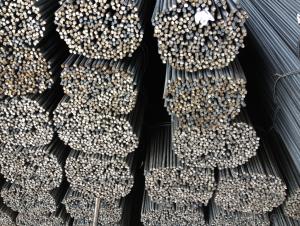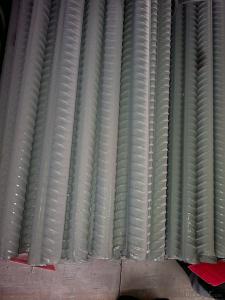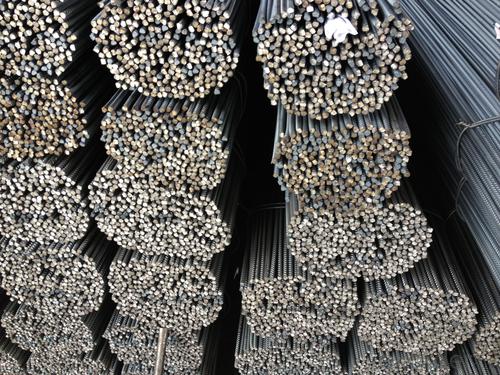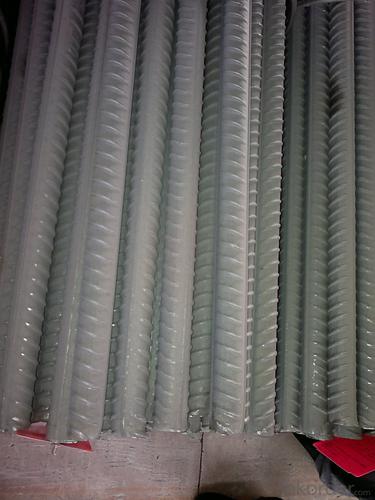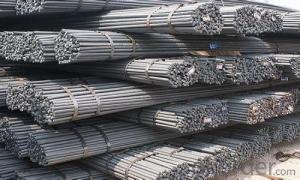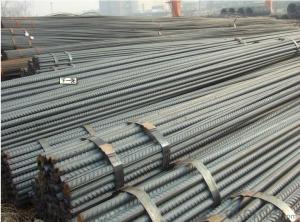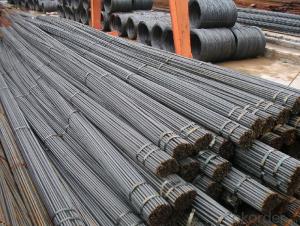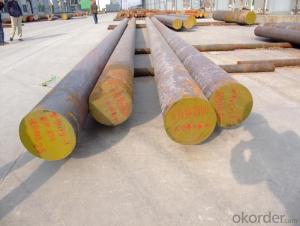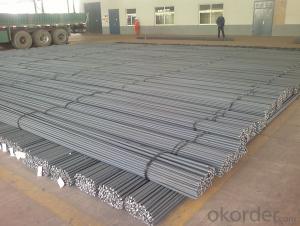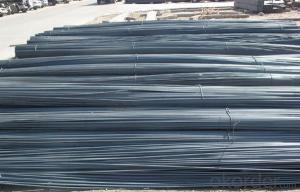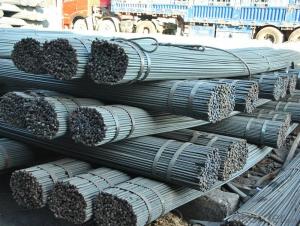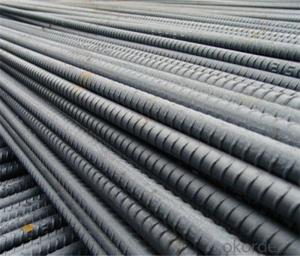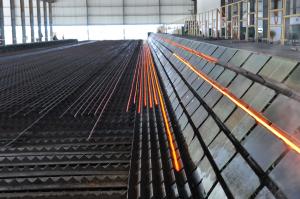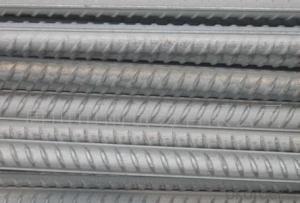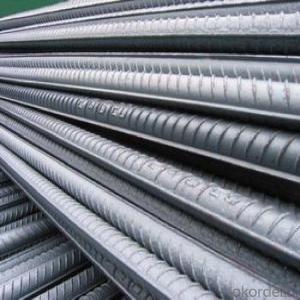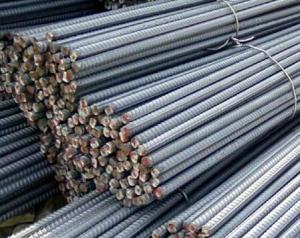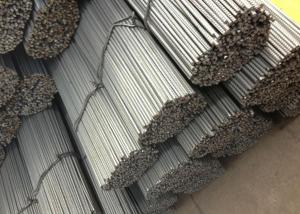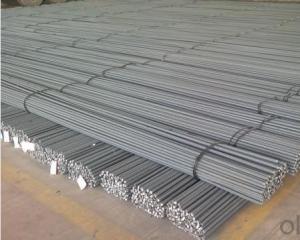Deformed Steel Bar, Iron Rods Bar for Construction/Concrete
- Loading Port:
- China main port
- Payment Terms:
- TT or LC
- Min Order Qty:
- 100 m.t.
- Supply Capability:
- 100000 m.t./month
OKorder Service Pledge
OKorder Financial Service
You Might Also Like
Product Description:
OKorder is offering Deformed Steel Bar, Iron Rods Bar for Construction/Concrete at great prices with worldwide shipping. Our supplier is a world-class manufacturer of steel, with our products utilized the world over. OKorder annually supplies products to African, South American and Asian markets. We provide quotations within 24 hours of receiving an inquiry and guarantee competitive prices.
Product Applications:
Deformed Steel Bar, Iron Rods Bar for Construction/Concrete are ideal for structural applications and are widely used in the construction of buildings and bridges, and the manufacturing, petrochemical, and transportation industries.
Product Advantages:
OKorder's Deformed Steel Bar, Iron Rods Bar for Construction/Concrete are durable, strong, and wide variety of sizes.
Main Product Features:
· Premium quality
· Prompt delivery & seaworthy packing (30 days after receiving deposit)
· Can be recycled and reused
· Mill test certification
· Professional Service
· Competitive pricing
Product Specifications:
Manufacture: Hot rolled
Grade: HRB335,HRB400,HRB500
Certificates: ISO, SGS, BV, CIQ
Length: 6m – 12m, as per customer request
Packaging: Export packing, nude packing, bundled
| DEFORMED BAR | |
| SIZE d(mm) | theoretical kg/m |
| 6 | 0.222 |
| 8 | 0.395 |
| 10 | 0.617 |
| 12 | 0.888 |
| 14 | 1.21 |
| 16 | 1.58 |
| 18 | 2 |
| 20 | 2.47 |
| 22 | 2.98 |
| 25 | 3.85 |
| 28 | 4.83 |
| 32 | 6.31 |
FAQ:
Q1: Why buy Materials & Equipment from OKorder.com?
A1: All products offered byOKorder.com are carefully selected from China's most reliable manufacturing enterprises. Through its ISO certifications, OKorder.com adheres to the highest standards and a commitment to supply chain safety and customer satisfaction.
Q2: How do we guarantee the quality of our products?
A2: We have established an advanced quality management system which conducts strict quality tests at every step, from raw materials to the final product. At the same time, we provide extensive follow-up service assurances as required.
Q3: How soon can we receive the product after purchase?
A3: Within three days of placing an order, we will arrange production. The normal sizes with the normal grade can be produced within one month. The specific shipping date is dependent upon international and government factors, the delivery to international main port about 45-60days.
Images:
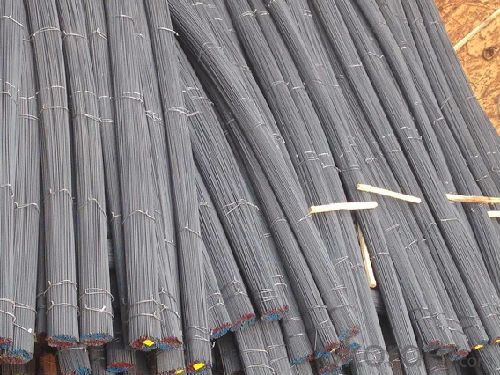
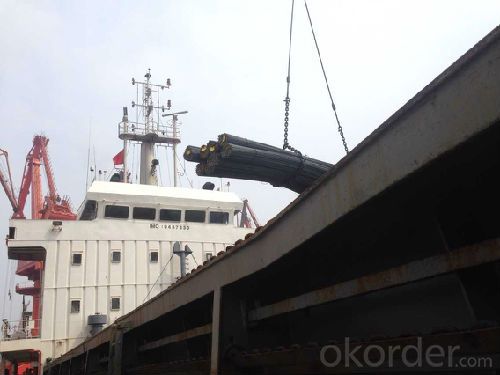
- Q: Can steel rebars be used for both residential and commercial construction?
- Steel rebars can serve for both residential and commercial construction purposes. They are widely employed as reinforcement in concrete structures to enhance their robustness and stability. Steel rebars are suitable for diverse construction endeavors such as residential buildings, commercial establishments, bridges, and infrastructure projects. By incorporating steel rebars, the concrete structure becomes capable of withstanding considerable loads, seismic activity, and other external forces. Regardless of whether it is a modest residential dwelling or a substantial commercial complex, steel rebars are a dependable and extensively utilized material for reinforcing concrete structures in both residential and commercial construction settings.
- Q: How do steel rebars affect the durability of concrete in freeze-thaw cycles?
- The durability of concrete in freeze-thaw cycles can be greatly enhanced by steel rebars. When exposed to freezing and thawing conditions, concrete undergoes expansion and contraction. During freezing, the water inside the concrete pores freezes and expands, exerting pressure on the surrounding concrete matrix. This can lead to cracks and deterioration of the concrete. However, the inclusion of steel rebars in the concrete can help alleviate these problems. Steel has a lower coefficient of thermal expansion compared to concrete, meaning it expands and contracts less with temperature changes. This property allows the steel rebars to absorb the stresses generated during freeze-thaw cycles, preventing significant damage to the concrete structure. Furthermore, steel rebars also reinforce the concrete, increasing its overall strength and toughness. This reinforcement helps distribute the stresses caused by freeze-thaw cycles more evenly throughout the concrete, reducing the likelihood of crack formation or propagation. Moreover, steel rebars act as a barrier against water penetration into the concrete. Moisture is a major contributor to freeze-thaw damage. The steel rebars assist in creating a more impermeable concrete structure by reducing the size and number of cracks, preventing water from entering and causing further deterioration. To sum up, steel rebars play a vital role in enhancing the durability of concrete in freeze-thaw cycles. Their ability to absorb stresses, reinforce the concrete, and prevent water penetration significantly reduces the potential for damage and extends the lifespan of the concrete structure.
- Q: How are steel rebars used in construction?
- Construction projects rely heavily on steel rebars, also known as reinforcing bars, to ensure the strength and stability of concrete structures. These rebars are strategically placed within the concrete formwork in a grid pattern before the concrete is poured. This grid formation effectively distributes tensile forces, preventing cracks and improving structural integrity. To achieve optimal reinforcement and withstand anticipated loads, rebars are placed at specific locations within the concrete elements. They are spaced apart at predetermined intervals, following design and engineering specifications. During the concrete pouring process, the wet concrete envelopes the rebars, establishing a strong bond between the two materials. As the concrete hardens and cures, it firmly grips the rebars, creating a composite structure capable of withstanding bending, shearing, and other types of stress. Steel rebars come in various sizes and grades, tailored to meet the unique requirements of each construction project. Typically made from carbon steel, they may have different surface finishes to enhance their bonding capabilities with concrete. In addition to providing strength, rebars also play a vital role in controlling cracking caused by shrinkage, temperature changes, and external forces. By absorbing and distributing these forces, they minimize the risk of structural failure, ensuring the overall stability and durability of concrete components. In summary, steel rebars are indispensable in construction as they reinforce concrete structures, increase load-bearing capacity, and prolong the lifespan of buildings and infrastructure. Proper placement and utilization of rebars are crucial for building resilience, ensuring safety, and maintaining structural integrity.
- Q: Can steel rebars be used in structures with limited construction space?
- Yes, steel rebars can be used in structures with limited construction space. Steel rebars are commonly used in reinforced concrete structures to provide tensile strength and reinforce the overall structural integrity. Due to their small size and flexibility, steel rebars can be easily maneuvered and installed in tight spaces. They can be bent, cut, or shaped to fit the specific requirements of the construction project. Additionally, steel rebars can be prefabricated off-site and transported to the construction site, which further facilitates their use in limited construction spaces. Overall, steel rebars are a versatile and practical choice for reinforcing structures with limited construction space.
- Q: Can steel rebars be used in structures with limited construction space?
- Yes, steel rebars can be used in structures with limited construction space. Steel rebars are versatile and can be easily maneuvered and placed in confined spaces. They are commonly used in construction projects with limited space, such as high-rise buildings, underground structures, and bridges. Their flexibility and strength make them a suitable choice for reinforcing concrete structures in tight construction areas.
- Q: When did the 1305 rebar contract become a major contract?
- The thread has 3 different contracts, which have been completed. They are continuous thread (1211 contract) and thread four (1303 contract). 1305 into the thread, even Sihui next month, into the thread, it will continue until April 13 years.
- Q: How are steel rebars protected against corrosion in aggressive environments?
- Steel rebars are protected against corrosion in aggressive environments through various methods. One common method is the use of protective coatings. These coatings can be applied to the surface of rebars to create a barrier between the steel and the corrosive elements in the environment. Examples of protective coatings include epoxy, zinc, and polyethylene coatings. In addition to coatings, steel rebars can also be protected through cathodic protection. This method involves connecting the rebar to a sacrificial anode, usually made of a more reactive metal such as zinc or magnesium. The anode corrodes instead of the rebar, effectively sacrificing itself to protect the steel from corrosion. Another method of protection is the use of corrosion inhibitors. These inhibitors can be added to the concrete mix or applied directly to the rebars. They work by reducing the corrosive potential of the environment or by forming a protective film on the surface of the rebar, preventing corrosion from occurring. Furthermore, proper design and construction practices can also contribute to the protection of steel rebars against corrosion. Adequate concrete cover can help create a physical barrier between the rebar and the aggressive environment, reducing the exposure of the steel to corrosive elements. Good drainage systems and the use of non-corrosive aggregates can also help minimize the exposure of rebars to moisture and other corrosive substances. Overall, a combination of protective coatings, cathodic protection, corrosion inhibitors, and proper design and construction practices are employed to ensure the protection of steel rebars against corrosion in aggressive environments. These measures help extend the lifespan of structures and maintain their structural integrity.
- Q: Can steel rebars be used in wastewater treatment plant construction?
- Yes, steel rebars can be used in wastewater treatment plant construction. Steel rebars are commonly used in the construction of reinforced concrete structures, including wastewater treatment plants. They provide additional strength and durability to the concrete, helping it withstand the harsh conditions and corrosive environment often found in wastewater treatment facilities. The rebars are typically coated with epoxy or other corrosion-resistant materials to protect them from the corrosive effects of wastewater. Additionally, proper design and placement of the rebars ensure structural integrity and longevity of the treatment plant. Overall, steel rebars are a commonly used and effective reinforcement material in wastewater treatment plant construction.
- Q: How do steel rebars impact the overall construction cost estimation process?
- Steel rebars can have a significant impact on the overall construction cost estimation process. They are a crucial component in reinforced concrete structures, providing strength and durability. The quantity and quality of steel rebars required for a project can influence the material cost, labor cost, and construction timeline. Accurate estimation of steel rebars is essential to ensure the project's structural integrity while avoiding cost overruns or delays.
- Q: What are the potential risks of using steel rebars in construction?
- Some potential risks of using steel rebars in construction include corrosion, inadequate bonding with concrete, and potential for structural failure if not properly installed or maintained. Additionally, steel rebars can conduct electricity, posing a risk in areas with electrical currents or lightning storms.
Send your message to us
Deformed Steel Bar, Iron Rods Bar for Construction/Concrete
- Loading Port:
- China main port
- Payment Terms:
- TT or LC
- Min Order Qty:
- 100 m.t.
- Supply Capability:
- 100000 m.t./month
OKorder Service Pledge
OKorder Financial Service
Similar products
Hot products
Hot Searches
Related keywords
